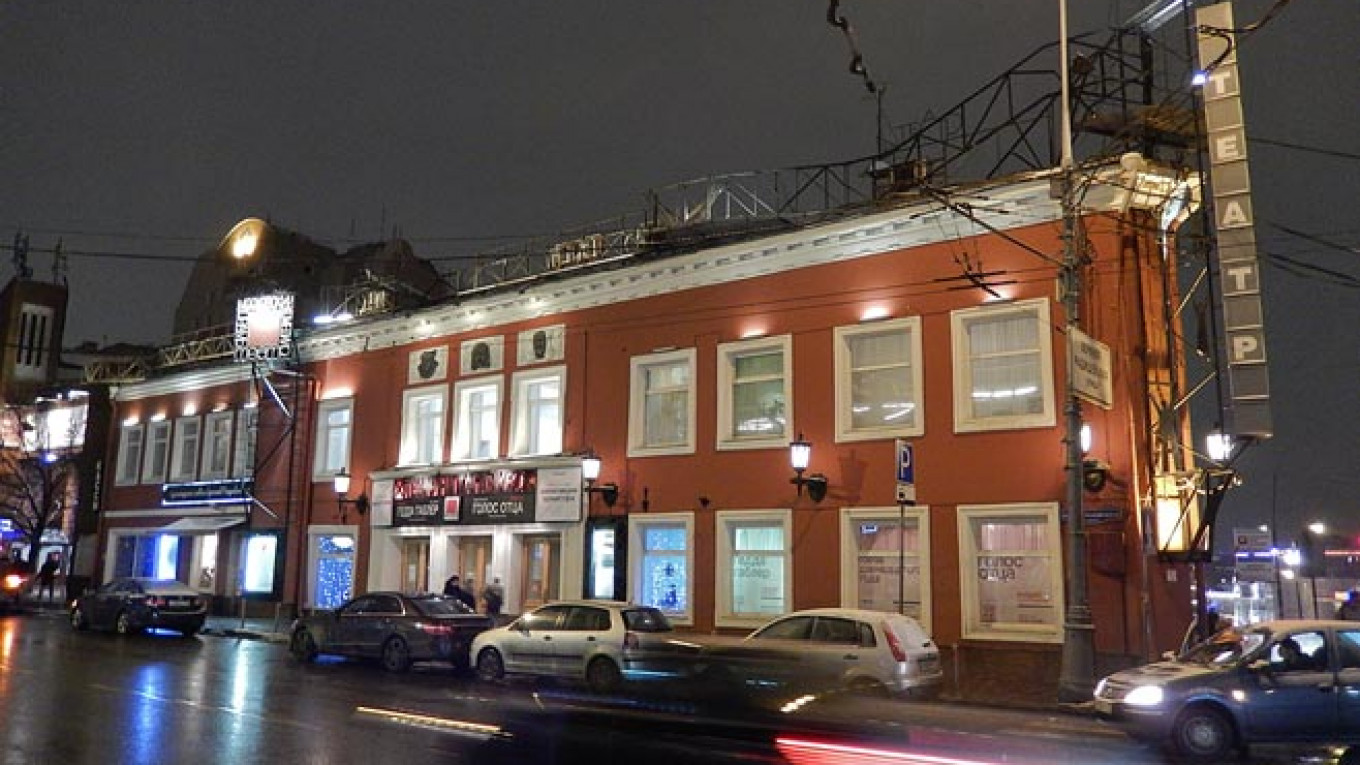There's an old Russian anecdote about a stolen coat that reminds me of the Taganka Theater.
"Someone stole a coat," the joke goes, "or had it stolen from them."
As regards the once-famous, increasingly notorious, Taganka Theater, the bit would go like this: "The Taganka Theater is attacking someone, or someone is attacking it."
Either way, you'd be right.
It has been a scandal-filled season for the Taganka, as various productions, exhibits and events marking the playhouse's 50th anniversary have been maligned, boycotted or sabotaged from inside and outside the theater. Following the latest outburst, both the Moscow Culture Committee and Vladimir Fleisher, the Taganka's managing director, fired back at attacks that went public Wednesday.
Fleisher threatened to sue a small group of actors who have made numerous public accusations about the theater's affairs, according to BBC's Russian Service. The Culture Committee, reported RIA Novosti, demanded "public apologies" on Thursday from two senators who "slandered" the theater.
The present row entered the public domain when Oleg Panteleyev, a senator in the Federation Council, claimed on Wednesday that the Taganka, in the spirit of "Kirill Serebrennikov's odious Gogol Center," is creating productions that "promote violence, homosexuality, pedophilia, suicide." He was backed by Valentina Matviyenko, the council's speaker, who ordered an investigation. Panteleyev apparently plumbed his information from the latest letter sent out by disgruntled actors.
Suggesting that the theater was engaging in subversive activities, according to an Interfax report distributed by numerous media outlets, Panteleyev declared that new plays being written by Dmitry Bykov and a certain "Mikhail Grinkov" parody and insult Russian history and official institutions. Furthermore, the politician claimed, the playhouse on March 15 hosted a "documentary festival called Maidan, where young people wearing bands of Right Sector, immediately came to the Maidan festival from Sakharov Square."
The Right Sector is generally agreed to be an organization of radical Ukrainian nationalists, while the reference to Sakharov Square alludes to a government-sanctioned peace march that gathered approximately 50,000 participants.
Playwright Mikhail Durnenkov, the "Grinkov" referred to by Panteleyev, told The Moscow Times that there wasn't a shred of truth in the Interfax article "aside from the names of the plays."
"Nothing else there has anything to do with reality," he added.
Reactions to the accusations made by Panteleyev quickly became fodder for discussion and ridicule in social media.
"I think we need to answer all these informants' denunciations and accusations of 'unpatriotism' and 'promoting suicide and immorality' with strong rhetoric," wrote playwright Yevgeny Kazachkov on Facebook. "They are engaging in the promotion of incompetence, stupidity and degradation while encouraging fascist reprisals against culture. This leads to the undermining of the stability and strength of our state."
Director and playwright Mikhail Ugarov was more acerbic in his Facebook response. "Homosexuality, violence, pedophilia and suicide," he scoffed. "Would somebody please show it to me instead of just promising it all the time!"
But it was the official response of the Culture Committee on Thursday that made this latest scandal stand out. It was a rare example of one government institution standing up to another. Making it even more remarkable is the fact that it was a small, municipal department taking on members of the mighty federal house of representatives.
"Not one of the senator's assertions is in accordance with the truth," Alla Semyonysheva, the Culture Committee press secretary, told RIA Novosti. "For example, there was no 'Maidan' at the theater, but rather a festival called 'Depository Item,' where plays about the theater were read."
In regards to the plays by Bykov and Durnenkov she pointed out that the former, referred to in some sources as "Sheremetyevo-3," and reportedly an intended satirical account about American whistle-blower Edward Snowden's stay at Sheremetyevo Airport late last year, was never written. She described the play by Durnenkov, tentatively entitled "Victory Day," as "very patriotic."
"We outlined all these assertions and sent a letter to Valentina Ivanovna Matviyenko and Oleg Yevgenyevich Panteleyev, in which we demand public apologies. The theater has been slandered, moreover in its jubilee year. Basically this is damaging to the theater's reputation and it is simply blatant lies. As such we publicly demand that Oleg Yevgenyevich also declare publicly in the Federation Council that these assertions do not correspond to reality. And that he apologize to the theater."
As of Sunday there was no response from Panteleyev.
At week's end, senior stage hand Roman Staburov posted a long blog on the official Taganka Theater website that details the history and nature of the ongoing conflicts. He attributes the dissent at the theater to three actors and one director who, Staburov describes, were leaders among those who pushed Taganka founder Yury Lyubimov to resign as artistic director in 2011, and have continued to foment turmoil ever since.
This small group's intent, according to Staburov, is "to split and destabilize the company and, having destroyed it, to stop the theater's work, to drag theater employees into internal conflicts, conflicts with the administration and the [Culture] Committee, and to ruin the celebration of the jubilee at any price, so that in conditions of chaos, they may again come to power and again receive access to the theater's coffers."
The Taganka's happy 50th birthday takes place April 23 come hell or high water.
Contact the author at jfreedman@imedia.ru
A Message from The Moscow Times:
Dear readers,
We are facing unprecedented challenges. Russia's Prosecutor General's Office has designated The Moscow Times as an "undesirable" organization, criminalizing our work and putting our staff at risk of prosecution. This follows our earlier unjust labeling as a "foreign agent."
These actions are direct attempts to silence independent journalism in Russia. The authorities claim our work "discredits the decisions of the Russian leadership." We see things differently: we strive to provide accurate, unbiased reporting on Russia.
We, the journalists of The Moscow Times, refuse to be silenced. But to continue our work, we need your help.
Your support, no matter how small, makes a world of difference. If you can, please support us monthly starting from just $2. It's quick to set up, and every contribution makes a significant impact.
By supporting The Moscow Times, you're defending open, independent journalism in the face of repression. Thank you for standing with us.
Remind me later.







